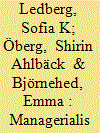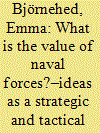| Srl | Item |
| 1 |
ID:
187109


|
|
|
|
|
| Summary/Abstract |
This article analyzes civil–military relations and the issue of civilian control through the lens of new managerialism. It illustrates that the means and mechanisms applied by governments to govern the military actually shape its organization and affect its functions in ways not always acknowledged in the civil–military debate. We start by illustrating the gradual introduction of management reforms to the Swedish Armed Forces and the growing focus on audit and evaluation. The article thereafter analyzes the consequences of these managerialist trends for the most central installation of the armed forces–its headquarters. It further exemplifies how such trends affect the work of professionals at the military units. In conclusion, managerialist reforms have not only changed the structure of the organization and the relationship between core and support functions but have also placed limits on the influence of professional judgment.
|
|
|
|
|
|
|
|
|
|
|
|
|
|
|
|
| 2 |
ID:
186204


|
|
|
|
|
| Summary/Abstract |
There are several, often mentioned, strategic and tactical advantages related to naval forces which occur as a result of their inherent characteristics. Because they possess both mobility and a light footprint, naval forces have the ability to be simultaneously present in a given place while being minimally intrusive, a feat no other service branch can accomplish: “[t]he fact that naval forces can ´loiter´ and be minimally intrusive is an important and unique contribution to deterrence. The Army can loiter, but it cannot be minimally intrusive; the Air Force can be minimally intrusive but it cannot loiter. Only naval forces can do both simultaneously” (UK Maritime Power 2017, 37). Moreover, with the sea as the area of operations naval forces are an essential instrument for the state not only in war, but in peacetime as well. In comparison to the army and air force, naval forces are useful to the state outside a war context as they provide prosperity to the state through the protection of shipping lanes and civilian vessels. Given these inherent and unique characteristics and our unchanging dependence on the sea for goods and trade, the value of naval forces would seem self-evident.
|
|
|
|
|
|
|
|
|
|
|
|
|
|
|
|